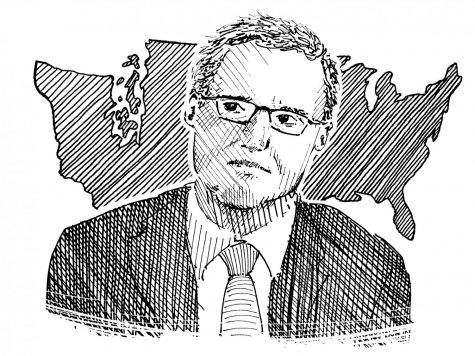Can Jay Inslee Become the Climate Change President?
April 3, 2019
Washington state governor Jay Inslee has set climate change as the sole focus of his campaign for president, calling on Americans to step up to the defining threat of our generation. “We are the first generation to feel the sting of climate change, and we are the last generation that can do something about it,” Inslee said at his campaign announcement.
Climate change has been the signature issue of Inslee’s 30 years in elected office, so he is well aware of Americans’ reluctance to vote for it. Even voters who believe in global warming still worry that environmental regulations and policies will hurt the economy and kill jobs. Based on these concerns, Washingtonians broadly rejected Inslee’s carbon-tax in the last two elections.
Despite this reluctance to vote, Americans still say they want the government to do more to fight climate change. Nearly two-thirds say the government is doing “too little on the environment,” according to Pew Research Center, and more Democrats than ever (75 percent) think that climate change should be one of the top priorities for the president and Congress.

Increasingly common and extreme weather events — and a grim report from the United Nations’ climate research body — have convinced some voters that the cost of inaction is far greater than those of climate policy. This is why Inslee tells every audience that “this is our climate moment.”
Tyee Williams, a senior Environmental Studies-Politics major and co-president of Campus Climate Coalition, agrees that “now is the ideal time to run on climate.”
By branding climate change as the sole focus of his campaign, Inslee is hoping to stand out in a diverse primary with big names and a high degree of conformity. Dr. Phil Brick, an environmental politics professor at Whitman, is “not optimistic” Inslee’s strategy will work.
“Only Inslee is making this the centerpiece of his campaign, and it’s not exactly a crowd pleaser,” Brick said.
In fact, just 3 percent of Democrats rank climate change as their No. 1 most important issue when voting for candidates, favoring “immediate” concerns like healthcare, jobs and immigration, according to Yale Program on Climate Change and Communication.
Other candidates’ embrace of climate policy will also challenge Inslee to distinguish himself as the climate guy. The majority of contenders have embraced the Green New Deal, a lofty vision for a green and equitable economy. Climate change is a core issue for Senators Bernie Sanders, Kamala Harris and Cory Booker as well.
For voters to elect Inslee, they must believe he can get his green vision inked into law. Although Inslee insists that he has “achieved important climate policy,” his record does not impress Professor Brick.
“To be a truly credible candidate on climate, Inslee needs a credible record of climate accomplishments,” Brick said. “He does not have that.”
Passing the first statewide carbon-tax would have given Inslee considerable environmental clout, but its failure forces Inslee to rely on his lower-profile climate achievements, including investment and incentive packages and environmental regulations.
Inslee’s most impressive achievements are not actually environmental, but economic. Edward-Isaac Dovere summed up Inslee’s gubernatorial tenure in an article for The Atlantic:
“On Inslee’s watch, the state has boosted health care, increased access to early-childhood education and college, raised the minimum wage, expanded paid family leave, invested in infrastructure, and established in-state net neutrality, all while leading the country in job growth, overall personal-income growth, and GDP.”
While the 68 year-old governor’s record is undeniably progressive, it may not be enough for progressive Democrats who want on a strong leader in identity politics and are tired of older white men in charge. Professor Brick thinks that Inslee’s narrow-sighted campaign and lack of celebrity will also hurt his chances to compete.
“Quite frankly, he seems easily eclipsed by more media-savvy and telegenic candidates with a similar message on climate and more compelling ideas on a broader range of social issues,” Brick said.
Inslee’s record of climate incrementalism has also fallen out of fashion in the Democratic Party that is more intrigued by the uber-ambitious vision of the Green New Deal.
“I think that the conversation around climate change has been a scientific and technocratic debate for a while, and I don’t see that as an effective strategy,” said Williams. “Focusing on intersectional climate justice is the only way to adequately address climate change and humanize the issue to bring it out of strictly climate science realm (which hasn’t been able to create big changes) and into a political realm.”
“Good connections are there for the making,” said Brick, “but so far, few specifics.”
His chances to win are slim, but Inslee can raise climate change’s profile if he can stitch voters’ priorities into his vision of a green economy. For some climate activists, it’s a “win” if Inslee can pull ambitious climate policy into the mainstream debate.





